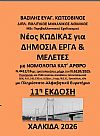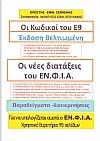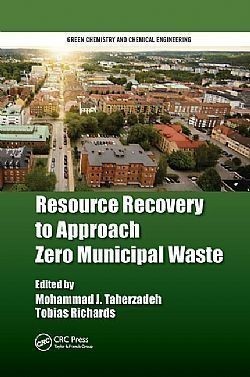ΚΑΤΗΓΟΡΙΕΣ
NEWSLETTER
Συπληρώστε το email σας
για να λάβετε τις προσφορές
και τα νέα της Bookstation
ΝΕΟΙ ΤΙΤΛΟΙ
-
Νέος Κώδικας για Δημόσιες Συμβάσεις -11η έκδοση
Κωτσοβίνος Ευαγ. Βασίλης προσθήκη στο καλάθι
προσθήκη στο καλάθι
ISBN 978-618-84598-2-3
Τιμή | 54 € -
Πλήρης Οδηγός Φορολογιών Κατοχής Ακινήτων (Δήλωση Ε9/ΕΝΦΙΑ-Πιστοποιητικό/ΕΦΑ)
Αννα Κόλλια προσθήκη στο καλάθι
προσθήκη στο καλάθι
ISBN 978-618-83144-9-8
Τιμή | 54 € -
Οι κωδικοί του Ε9 (Δήλωση Ακινήτων)-2024 -ΑΜΕΣΑ ΔΙΑΘΕΣΙΜΟ
Ορέστης Εμμ. Σεϊμένης-Μανούσος Ιωάν. Ντουκάκης προσθήκη στο καλάθι
προσθήκη στο καλάθι
ISBN 978-618-87035-0-6
Τιμή | 54 €
περισσότερα >
Κατηγορίες / Offers / Τechnical / Electricians / Resource Recovery to Approach Zero Municipal Waste

Resource Recovery to Approach Zero Municipal Waste
Mohammad J. Taherzadeh, Tobias Richards
Εκδόσεις
Crs Press
ISBN: 978-148-224-035-1
Σελίδες: 359- 28 Color & 76 B/W Illustrations
Σχήμα: 6.5 x 1 x 9.5 inches
Εξώφυλλο: Hardcover
Ημερομηνία έκδοσης: 29/07/2015
Τιμή | 138 €
- Provides an overview of the state of the art of solid waste management toward zero waste
- Discusses source separation of waste and the conversion of organic and biological waste into compost, biogas, and biofertilizer
- Considers the combustion of waste in combined heat and power plants, as well as recent developments in the gasification and pyrolysis of waste
- Explores various glass, metal, electronic waste, thermoset composite, paper, and fiber recycling technologies
- Examines landfill mining and encourages product design optimized for recycling
- Describes material designing for considering end of life recovery
Summary
Current development results in a linear flow from raw material to waste, which cannot be sustainable in the long term. Plus, a global population of 7 billion people means that there are 7 billion waste producers in the world. At present, dumping and landfilling are the primary practices for getting rid of municipal solid waste (MSW). However, this waste contains resources that we?ve yet to utilize. To create sustainable societies, we need to approach zero waste by recovering these resources.
There are cities and countries where zero waste is close to becoming a reality. Landfilling of organic waste is forbidden in Europe, and countries such as Sweden, Germany, Belgium, and Switzerland have developed a variety of technologies to recover resources from MSW.
Resource Recovery to Approach Zero Municipal Waste explores the solid waste management laws and regulations of different countries, comparing the latest resource recovery technologies and offering future perspectives. The book tackles the many technical, social, ecological, economical, and managerial aspects of this complex subject while promoting the development of sustainable societies to achieve a greener global environment.
ΑΝΑΖΗΤΗΣΗ
Σε όλες τις κατηγορίες
ΑΝΑΚΟΙΝΩΣΕΙΣ
9/5/2012 2:16:56 μμ
περισσότερα >
BEST SELLERS
-
Νέος Κώδικας για Δημόσιες Συμβάσεις -11η έκδοση
Κωτσοβίνος Ευαγ. Βασίλης προσθήκη στο καλάθι
προσθήκη στο καλάθι
ISBN 978-618-84598-2-3
Τιμή | 54 € -
Λατινικά ...για 20! (για τη Γ' Λυκείου)
Χρήστος Ζηκούλης προσθήκη στο καλάθι
προσθήκη στο καλάθι
ISBN 978-618-5837-00-6
Τιμή | 50 € -
Λατινικά...για 20! (Για τη Β' λυκείου)
Χρήστος Ζηκούλης προσθήκη στο καλάθι
προσθήκη στο καλάθι
ISBN 978-618-86835-9-4
Τιμή | 25 €
περισσότερα >

